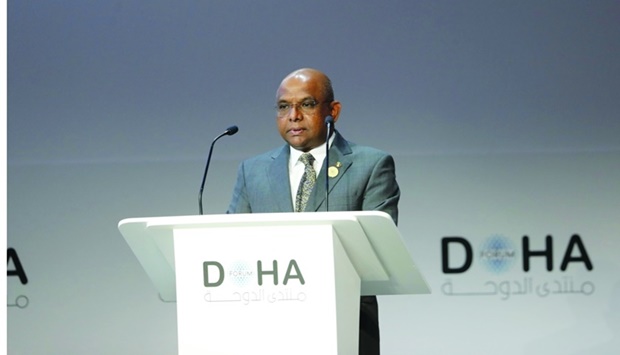In a speech in the opening of 20th edition of Doha Forum, which kicked off Saturday under the theme "Transforming for a New Era", Shahid said that Qatar 2022 will be the first carbon-neutral FIFA World Cup in history, noting that the design and construction of the stadiums have factored for lower energy consumption, recycling of water and construction materials, highly efficient cooling systems, green transportation, natural lighting, green landscaping and disabled-friendly access systems.
He applauded the efforts of Qatar under the leadership of His Highness the Amir Sheikh Tamim bin Hamad al-Thani in ensuring that the tournaments planning is based on the idea that generations to come should find our shared planet greener and more equitable. He underlined that Qatar has made exceptional preparations to create a lasting legacy for Qatar, the Middle East, Asia, and the world through the FIFA World Cup.
He noted that Doha Forum 2022 is just another example of the vision of His Highness the Amir in positioning Qatar at the forefront of global policymaking, promoting critical dialogue, and engaging leaders from diverse policy backgrounds and expertise to address current and emerging global challenges and advance pragmatic solutions.
He added that the success of Doha Forum and its emergence as the premier forum of choice for the worlds top decision-makers and influencers is also reflective of Qatar's emergence on the global platform as a key strategic and international partner for conflict resolution, preventive diplomacy, soft power diplomacy, and humanitarian assistance.
On the Ukrainian Crisis, he renewed the call for an immediate ceasefire and to resolve disputes through diplomacy and dialogue.
"We are all now witnessing the unfolding of a grave humanitarian crises in Ukraine, a victim of Russian military aggression. I take this opportunity to reiterate that these tragedies have no place in our world. They are reminiscent of a bygone, brutal age, that we have tried to put behind us for the past 76 years."
He said that Doha Forum comes at a time of fragility and vulnerability due to the Covid-19 pandemic and the conflicts that shook the foundations of the multilateral institutions.
He noted that the world faces multiple armed conflicts, rising extremism, nuclear proliferation, cyber threats, disinformation, and the widening impacts of climate change; and that millions of people are suffering the consequences of inequality, regional rivalries, and an erosion of basic freedoms, trends which have been accelerated and amplified by the Covid-19 pandemic, adding that 274mn people, including women and children are in need of urgent humanitarian assistance and protection.
He pointed to crises and challenges in many countries, referring to Afghanistan which now confronts a grave humanitarian crisis, noting that it's economy has tanked, and the financial sector is paralysed. All this comes on top of a punishing drought.
He also noted that Ethiopia's crisis continues, and Sudan's once-promising political transition has veered off course. In addition, the crisis engulfing the Sahel region of North Africa continues to worsen, and Yemen's war has caused what the UN still deems the worlds worst humanitarian disaster.
On Libya, Shahid said that rival military coalitions in Libya are no longer fighting, and the UN has restarted negotiations aimed at reunifying the country. But reaching lasting peace will still be an uphill struggle.
He also noted that Haiti continues to be tormented by political crises, gang warfare, and natural disasters. As for Myanmar, the 2021 coup returned the country to military rule and shattered hopes for democratic progress in a country that has been beset by decades of conflict and repressive regimes.
Shahid said that the world has struggled to cope with the immense strain of Covid-19 for over two years. Many of people have experienced the virus directly, and all of people have experienced it indirectly. Those fortunate enough to live in a country with high vaccine-accessibility are especially hopeful that this could soon be the case.
But in countries with low vaccine-accessibility the pandemic continues to leave its tragic marks.
"The danger of more variants emerging is very real, threatening to undo all that we have achieved.
There is only one solution: universal vaccination," he stressed.
He underlined that among the many casualties of Covid-19 has been the Decade of Action on the Sustainable Development Goals.
This is evidenced by sharp rises in poverty, increased food insecurity, and the erosion of basic social protections, with detrimental effects on women's rights and access to education, among others.
Shahid made three recommendations to transform the Decade of Action into a Decade of Recovery.
"Firstly, we must put in place a financial system that helps the most vulnerable countries LDCs, LLDCs, and SIDS to better manage the liquidity issues wreaking havoc on their economies and causing their poorest to suffer," he said.
He underlined that the recent adoption of the Doha Programme of Action for the Least Developed Countries for the Decade 2022-2031 on March 17 is a welcome development, noting that the Programme of Action commits the world to a new generation of renewed and strengthened commitments between the Least Developed Countries and their development partners, as well as the private sector and civil society.
"Secondly, if we want to accelerate sustainable development, equipping billions of people with the digital tools to excel in the 21st century is a low-hanging fruit. We must also protect the safety and security of users from cyber threats. And we cannot allow digital platforms to be used to spread disinformation, intolerance and bigotry," he said.
"Thirdly, of all the challenges that we confront, none is as broad in scale or as existential in consequences, as the climate crisis. From geopolitics to food-security, from migration to preserving biodiversity, the sheer range of potential spill over effects of climate change is staggering and puts all of our well-being into jeopardy. We cannot be serious about addressing 21st century challenges unless we are serious about addressing climate change," he stressed.



